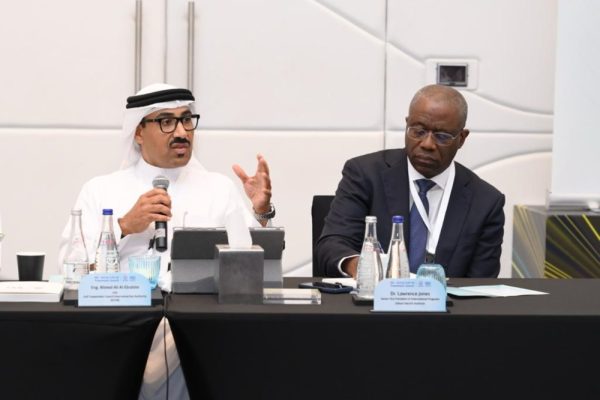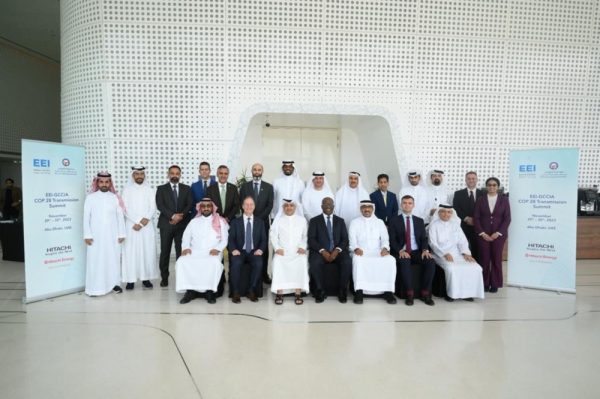Meeting Electricity Demand with Higher Penetration of Renewables in Middle East and Other Parts of Globe Requires Urgent and Significant Expansion of Electric Transmission Infrastructures Worldwide
Abu Dhabi, UAE, 3 December 2023: The EEI-GCCIA COP 28 Transmission Summit, hosted by the GCCIA in Abu Dhabi Yas Island, concluded successfully, marking a momentous achievement in the pursuit of a sustainable and resilient energy future.
Organized jointly by the Gulf Cooperation Council Interconnection Authority (GCCIA) and the Edison Electric Institute (EEI), the summit convened global energy leaders, industry experts, and professionals, including; Dr. Saifur Rahman, President, IEEE; Pedro Azagra, CEO, Avangrid; Ruth Forbes, President and CEO, Fortis TCI; Dr. Atif Saif Al Yafei, CEO, Abu Dhabi Transmission and Despatch Company (TRANSCO); Elliot Mainzer, President and CEO, California ISO Dale Friesen, Senior Vice President, ATCO Group; Dr. Nenad Keseric, Senior Vice President, Statnett; Adrian Timbus, Head of Portfolio and Market Strategy, Hitachi Energy; and Pierre Bernard, Managing Partner, Bernard Energy Advocacy. The Summit was moderated jointly by Dr. Lawrence Jones, Senior Vice President, Edison Electric Institute, and Engineer Ahmed Al Ebrahim, CEO, GCCIA.


Estimates from the summit’s participants revealed an unprecedented surge in global electricity generation, soaring from 12,000 terawatt-hours in 1990 to surpassing 29,000 terawatt-hours in 2022. Furthermore, the Middle East, as discussed during the summit, is poised to generate enough solar energy to power 800,000 homes by 2030. These facts underscore the critical need and urgency to adapt and expand transmission infrastructure to meet the demands of a rapidly evolving energy landscape.
Discussions revolved around supply chain challenges, workforce shortages, strategies for ensuring readiness for the energy transition, and the need to focus on maintaining reliability in the face of volatile weather conditions. Funding models for transmission infrastructure emerged as a crucial point of discussion, exploring various models supporting the growth of renewables while ensuring that reliability and resilience are never compromised. The summit also addressed critical questions related to system planning, cost allocation, and asset optimization.
Abu Dhabi’s commitment to renewable energy programs was highlighted in the summit, aligning with the UAE Energy Strategy 2050, targeting a mix of 44 percent clean energy, 38 percent gas, and 12 percent clean coal.
Eng. Ahmed Al Ebrahim, CEO of GCCIA, emphasized, “The Summit served as a dynamic platform for leaders, experts, and stakeholders to collaboratively address challenges and opportunities in the realm of transmission infrastructure. The outcomes of these deliberations will definitely contribute significantly to advancing the energy transition agenda, enhancing resource adequacy, and fortifying transmission systems for a sustainable and resilient future.”
Dr. Lawrence Jones, Senior Vice President of International Programs at Edison Electric Institute said: “This summit offered a vital platform for electric companies to share experiences and address similar challenges in their unique regulatory, policy, and economic setting. The open and collaborative nature of the discussions is another demonstration of EEI’s tagline ‘Power by Association’. The commitment to solar energy in the GCC region aligns with the shared goal of advancing sustainable and resilient energy solutions globally. The experience from integrating large solar plants here will be useful for grid operator in other countries.”
The summit featured discussions on the latest advances in grid technologies, emphasizing technological innovations for grid resiliency and mitigating risks associated with extreme weather conditions.
Participants also critically examined policies and regulatory frameworks needed to strengthen and support transmission expansion in anticipation of discussions at COP 28.
The second day included an informative workshop addressing critical questions related to system planning, cost allocation, and asset optimization. A key theme was how to operate transmission systems with growing renewable penetration.
Participants also discussed the need to accelerate the research, development, and deployment of advanced transmission technologies to ensure a future-ready system, as a crucial element for transitioning to energy systems with large amounts of renewable energy. The insights shared over this two-day summit reiterated the critical role of transmission in the energy transition with opportunities for dialogue and collaboration expected to continue.




















